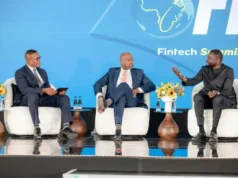The Economic and Financial Crimes Commission (EFCC) has sounded a fresh alarm, revealing that corrupt Nigerian politicians and criminal syndicates are increasingly using cryptocurrency wallets to hide stolen public funds and evade detection. The revelation was made this week at the African Anti‑Corruption Day commemoration in Lagos. It exposes concerning new dimensions in digital asset misuse—underscoring the urgent need for advanced forensic capabilities and tighter regulation.
Table of Contents

A New Frontier for Illicit Finance
At the core of these revelations is EFCC Chairman Ola Olukoyede. Though absent in person, his comments were conveyed by Acting Zonal Director Mr. Ahmed Ghali during the event spotlighting “Understanding Virtual Assets and Investment Fraud.” The chairman emphasized that while decentralised digital assets aren’t illegal by nature, when manipulated by corrupt individuals, they become powerful tools for laundering illicit wealth.
“Fraudulent politicians are already perfecting schemes and hiding their loot in cryptocurrencies to beat the investigative dragnets of anti‑corruption agencies,” Olukoyede stated.
These politicians are reportedly funnelling ill-got gains into crypto wallets—effectively warehousing stolen funds in semi-anonymous digital spaces to slip past regulatory oversight.
Digital Assets: A Shadowy Haven for Ill-Got Gains
Speaking at the Lagos event, EFCC technical adviser Alex Ogbole deconstructed the mechanics at play. He emphasised the immutable nature of blockchain—the backbone of most cryptocurrencies—and explained how decentralisation enables peer-to-peer trading beyond the purview of traditional financial intermediaries. While blockchain’s transparency provides audit trails, savvy criminals exploit complex chains, wallet migration, and anonymous tokens to conceal illicit activity.
Ogbole also pointed out a key vulnerability: fraudsters often capitalise on victims’ unawareness. “We’re seeing educated professionals falling into well-coordinated digital scams,” he observed.

Fraud Tactics: Ponzi Schemes, DeFi Rug‑Pulls, Fake ICOs
Head of the EFCC’s Advance Fee Fraud Section, Abbah Sambo Usman, provided a deep dive into how digital asset fraud is orchestrated. These tactics include:
- Ponzi schemes disguised as crypto programs
- DeFi “rug‑pulls”, where developers vanish with investors’ funds
- Fake ICOs luring investors into nonexistent projects
- Bogus trading apps designed to collect credentials and deposits
Citing Crypto Bridge Exchange (CBEX) as a case in point, Usman described it as “a textbook digital Ponzi scheme” offering unrealistic returns—1% twice daily plus referral fees—but ultimately defrauding thousands
He also highlighted a 2023 case: a 27‑year‑old Nigerian, Iheohakara Gabriel, was sentenced for defrauding a Brazilian using a crypto scam platform hosted on Telegram. Gabriel received a year in prison or a ₦1 million fine, 1,000 hours of community service, restitution of the stolen funds, and forfeiture of his iPhone 13 Pro Max.
Confronting the Growing Threat
EFCC officials underscored that digital asset fraud is not beyond reach. Through a multifaceted strategy emphasising intelligence gathering, disruption of criminal networks, and asset recovery, the agency has achieved breakthroughs—including indictments of CBEX operators.
However, challenges remain, notably:
- Fragmented cooperation across domestic agencies
- Jurisdictional barriers in cross-border investigations
- Political interference and manipulation by powerful suspects
Echoed Olukoyede: “Corruption is fighting back … we face threats, bribery attempts, and media manipulation from suspects trying to neutralise investigations.”
A Call for Cross‑Sector Collaboration
The event drew participants from the banking sector, Bureau de Change operators, civil society, legal experts, cybersecurity professionals, and the Blockchain Industry Coordinating Committee of Nigeria (BICCoN).
Speakers emphasised that a unified front is essential. As Mr. Ghali put it, “The fight against corruption is not a one‑man task. Everyone must be involved.”
There was broad agreement that crypto operators in Nigeria are now open to regulation and keen to integrate with mainstream financial systems. BICCoN advocated for an inclusive legal framework that enables them to operate transparently, pay taxes, and contribute positively to the economy.
Regulatory and Legal Milestones
Recent policy shifts include:
- February 2021: Central Bank of Nigeria bans financial institutions from supporting cryptocurrency transactions
- Late 2023: Partial relaxation and regulated permissions issued by the apex bank
- Nigeria’s Securities and Exchange Commission (SEC) classifies certain crypto assets as securities, mandating AML compliance
- Nigeria Financial Intelligence Unit (NFIU) enhances digital forensic capacities and enforces reporting of suspicious crypto transactions
- The Cybercrime Act of 2015 continues to serve as legal backing for prosecuting cyber-enabled crimes.
Stakeholders suggested more formalised coordination—such as memoranda of understanding between regulators, law enforcement, and crypto firms—to enable real-time intelligence sharing and responsive oversight.
Building Awareness & Strengthening Defences
With virtual assets evolving rapidly, EFCC and its partners have intensified public education campaigns. The goal: equip citizens with the knowledge to identify warning signs of investment fraud—from suspiciously high yields and anonymous endorsements, to poorly documented whitepapers and shady referral incentives.
Ogbole cautioned, “The biggest threat isn’t the technology—it’s ignorance of how criminals use it.”
Outlook: Remaining Vigilant in a Digital Age
In closing remarks, EFCC officials expressed optimism coupled with resolve. They recognise that corruption is adapting—and that their response must be equally nimble. By investing in bandwidth, forensic tools, and inter-agency cooperation, they hope to stay one step ahead. But they also reminded the public that prevention starts with informed individuals.
As EFCC head Olukoyede put it: “Virtual assets fraud and investment scams are preventable. Adequate knowledge and understanding of the issues involved is the escape route.”

What This Means for You
- Policymakers must push through regulatory frameworks that combine innovation with strict oversight
- Crypto firms must embrace transparency, compliance, and cooperative intelligence-sharing
- Citizens and investors should conduct thorough due diligence and report suspicious platforms
- Enforcement agencies need to deepen technical expertise and pursue cross-border legal collaboration
Conclusion
As EFCC continues its battle, a powerful message cuts through: hiding in crypto is no longer a secure refuge for corrupt individuals. With enhanced legal tools, forensic technology, and public vigilance, Nigeria is forging a stronger line of defence—one built on transparency, education, and inter-sector dialogue.
Join Our Social Media Channels:
WhatsApp: NaijaEyes
Facebook: NaijaEyes
Twitter: NaijaEyes
Instagram: NaijaEyes
TikTok: NaijaEyes





